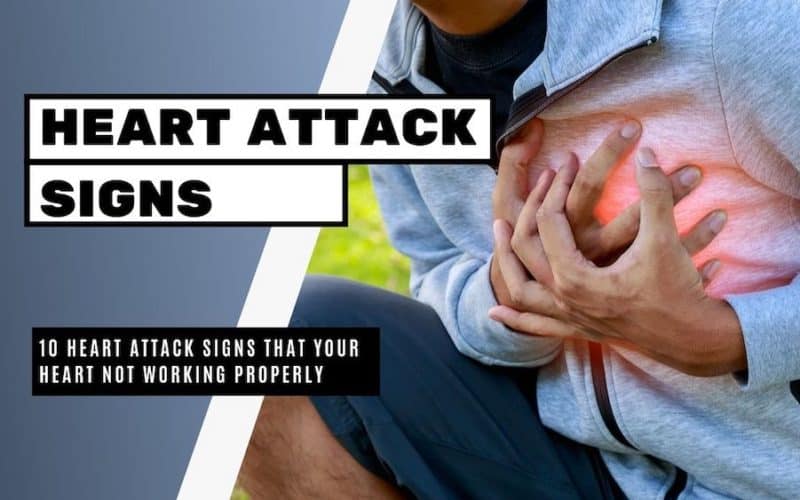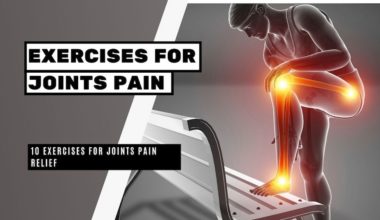Your heart functions without you even thinking about it, like breathing or digesting food. On an average day, your heart will beat about 115,000 times. A lot of times, though, your heart could be sending you early signs of a heart attack that are easily ignored, until it is too late. So, knowing those early heart attack signs is crucial as your life depends on it.
In this article, we have gathered ten heart attack signs that your heart does not work properly and that you are at risk for major heart blockage.
Heart Attack Signs that your Heart not Working Properly:
Heart attack signs can be very subtle; it is estimated that nearly half of all heart attacks are what is classified as “silent,” meaning the person affected was unaware that they were experiencing a heart attack at all.
Men and women both display heart attack warning very differently; men tend to have the chest clutching symptoms that we associate with heart attacks, while heart attack signs in women are more likely to feel nauseous and have pain in their jaw or back along with, or in place of, the chest discomfort.
Different pre-existing disease processes may alter heart attack warning symptoms as well, such as diabetes. Below, we listed ten heart attack warning signs which tell you that your heart does not work properly.
1. Swelling in your ankles, legs, and feet
According to Harvard Health Publishing, this is a very common early signs of heart disease that your heart isn’t circulating your blood properly. This is also the first warning sign of a disease called congestive heart failure (CHF).
CHF is characterized by fluid backing up into the heart, which is too weak to pump it efficiently. Your risk factors for CHF are high blood pressure, diabetes, and coronary heart disease.
This swelling, or edema, indicates a possibility for right-sided heart failure. Treating the underlying cause, like high blood pressure, as well as taking medications that remove the extra fluid that is causing strain on your heart, called diuretics, are a few of the treatment options available to help your heart perform more effectively.
2. Skipped or rapid heartbeats (palpitations)
When your heart is working properly, you don’t think about it at all. If your heart begins doing things that make you aware of it, it is an indication that something is wrong.
Some irregular heartbeats are caused by a disease process. For example, Atrial Fibrillation which means that your heart is sending its electrical impulses from all over the atrium, resulting in heartbeats that feel irregular, rapid, or too slow.
Another example, Ventricular fibrillation which occurs when your ventricles are not receiving the correct electrical impulses, this is a true life-threatening emergency. So, you should take this early heart attack sign seriously and seek for proper heart attack treatment.
3. Shortness of breath
According to the American Heart Association, If you are performing your ordinary daily activities and become easily winded, your heart could be telling you that something isn’t right.
For some reason, your heart isn’t getting the oxygen it requires which is also an early heart attack sign. Your doctor will medicate you based on his findings and where the problem is in your circulatory system.
4. Nighttime shortness of breath
This gets its own category because it is most likely from a different disease process than the one listed above. If you are unable to lie flat without becoming short of breath, you may be suffering from a more advanced congestive heart failure.
The weakness of the left side of your heart may be causing fluid to back up into your lungs, a condition known as left-sided heart failure. People suffering from CHF may only be able to sleep propped on multiple pillows or an upright chair due to their breathing difficulties when lying down.
5. Weakness
If you find yourself too weak to perform your daily activities, your heart could be to blame. You also may have feelings of dizziness and nausea. This is also a strong heart attack sign that your heart is not working properly. So, you need to address this issue with your doctor for proper treatment.
6. Chest discomfort that passes
If you are experiencing chest discomfort that feels like a heart attack but passes rather quickly, you may be suffering from angina.
Angina occurs when the heart muscle isn’t getting enough oxygen. Because angina and a cardiac event are so similar in nature, it is important to seek emergency medical help immediately. A doctor can only diagnose angina. Diagnosed angina is usually treated with rest and nitroglycerin.
7. Heaviness in your chest on physical exertion
Feeling heaviness in the chest after the physical activities? Then consider it as one of the early heart attack signs. If you get a heaviness or weighted feeling in your chest when performing physical activities, or when going outside into cold air, you could be suffering one of many heart valve diseases.
Your best option is to contact your doctor, so your doctor can run tests to find the source of your discomfort and take action to prevent heart attack.
8. Blue tinge to lips and poor capillary refill
When you press on your nail, it will turn a lighter color. When released, it will return to its normal color. This is a simple diagnostic test called capillary refill, and in healthy people, it takes less than two seconds.
If your capillary refill is more than two seconds, and you note bluish tinging to your lips or fingernails (not caused by cold weather), it may indicate that something is wrong with your heart and circulatory system. This requires additional testing by a physician, who will treat you based on his findings.
9. Fainting or passing out
If your body senses an issue with your circulation while you are standing or sitting, it is going to make you lie down whether you want to or not. Fainting, in this instance, is the body’s natural response to a perceived problem.
Fainting is never a normal thing, and for many, it can indicate a heart attack sign. If you are fainting or passing often then your best option for heart attack prevention will be to contact your doctor.
10. Chest pain
The pain that accompanies a heart attack sign is described as crushing, like a heavyweight on the chest. It can be centralized to one area of the chest, or it can be spread across your chest and wrap around your arms, particularly your left arm, and to your back.
A pain that is heavy and crushing is highly indicative that you are experiencing an active cardiac event. Some describe a “feeling of impending doom,” or a feeling that they are going to die, along with the pain.
This is a true medical emergency, and your response will be the difference between survival and becoming a statistic. Do not wait and see; if you are feeling chest pains, go immediately to the emergency room.
There are many signals your body will give you to tell you something isn’t right with your heart. Never ignore these ten warning signs of a heart attack; your life may depend on them. So, address these signs of a heart attack in time and meet your doctor as soon as possible. Regular exercise and the consumption of healthy foods for heart health will reduce the risk of a heart attack.






Comments are closed.